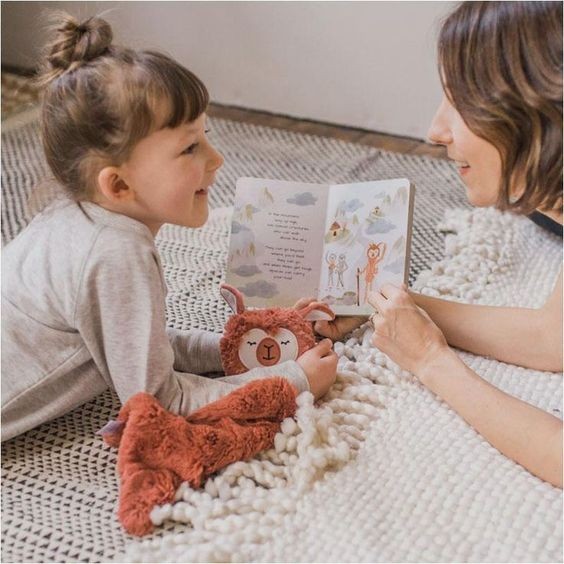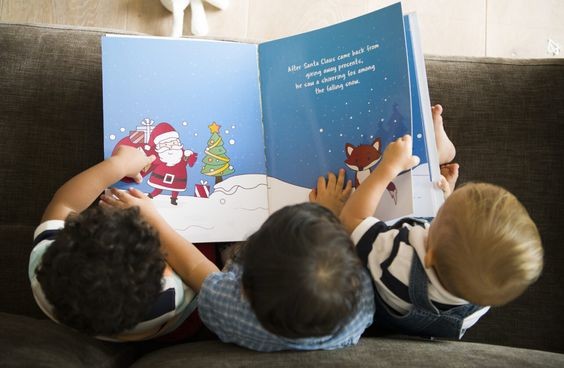Even if your baby can’t hold a book or learn the alphabet, don’t hesitate to introduce him or her to the wonderful world of books. Reading to your baby not only helps develop language skills, but also equips him or her with the social and emotional skills he or she needs for life.
Reading books has a positive impact on children's overall development.
According to a 2019 study, infants who are read to daily by their parents are exposed to approximately 78,000 additional words per year. This directly impacts a child’s future language skills and is one of the easiest ways for parents to help their children succeed academically.
Parents should form the habit of reading for children as early as possible (Photo: Pinterest)
When parents read to their children, they not only become familiar with different sounds and words, but also develop a love for books and a passion for reading. In addition, reading also stimulates children's imagination and helps them discover many wonderful things in the world around them.
According to Danielle Roberts, a pediatrician at Muskingum Valley Medical Center in Ohio (USA), reading to children not only helps them learn their mother tongue and develop language through hearing more words, but also helps them feel the love from the person reading to them.
Even though your baby may not be able to talk yet, that doesn’t mean he or she isn’t learning. In fact, from the moment he or she is born, your baby begins the journey of learning to speak. According to Heather Turner, a master’s in education, your baby’s brain develops more rapidly in the first year of life than at any other stage.
“When children are read to by their parents, they learn the sounds of language, the meanings associated with words, and the wonderful social element of communication,” explains Turner. “Reading also introduces unusual vocabulary and sentence structures, as well as elements like rhyme and repetition, which are important for children to learn to read later. As all parents know, habits matter, and establishing reading habits early on is one of the best ways for parents to set their children up for success, not only academically, but also socially and emotionally.”
On the other hand, not reading to children can have long-term effects. Dr. Roberts says that children who are not read to by their parents are likely to hear fewer words and may develop speech or language skills more slowly. As a result, they are more likely to have behavioral problems, such as aggression, stubbornness, and lack of concentration.
Research shows that children who are read to and talked to regularly will have a richer vocabulary and better reading ability than those who do not have the opportunity to be exposed to books.
Benefits of reading regularly to children
Reading books to children helps them develop comprehensively (Photo: Pinterest)
Reading to your child has countless benefits, even if they don’t understand everything you say. Here are some of the benefits of reading to your child:
-Help children learn about the world around them
-Teach children about the importance of communication
-Practice listening and memorization skills and increase children's vocabulary
-Introduce children to basic knowledge such as numbers, letters, colors and shapes
When should you start reading to your baby?
According to the recommendations of the American Academy of Pediatrics, reading to your baby from birth brings many practical benefits to your baby's development. Although babies cannot understand the content of the book, the tone and rhythm of the parent's voice will help the baby feel safe and relaxed.
It's never too late for parents to start reading to their children (Photo: Pinterest)
Parents should start reading to their children as early as possible. However, parents should not worry too much because according to Dr. Roberts and education expert Turner, it is never too late to start. As long as parents create the habit of reading to their children as early as possible, children will receive many benefits.
“For optimal results, parents should try to read aloud to their children every day. The period from birth to age 3 is an important period for children’s language and vocabulary development. Reading aloud during this period will help children build their vocabulary, expand their knowledge of the world around them, and recognize the sounds of written language. These are essential foundations for learning to read and write later,” Ms. Turner said.
For families with multiple children, reading together is a great bonding activity. In the early stages of a baby’s life, parents can allow older children to choose books to read with their younger siblings. This activity helps family members gather together and bond with the new baby.
Make reading to your child a daily habit so that he or she can develop comprehensively and have a solid foundation for the future.
Ideal Reading Frequency for Babies
Many young parents are concerned about reading to their newborns when they are busy caring for their own children. However, instead of seeing this as a burden, turn it into an opportunity to cuddle, relax and bond.
"Short reading sessions (about 5-10 minutes) are enough, as long as your child is paying attention," says Turner. "Reading to your child is like depositing money into their language bank account. The earlier you start and the more you read, the richer their vocabulary will be when they go to school."
Parents should set aside a certain amount of time each day, such as before bed, after a bath, or any other quiet time, to read to their children. Setting up a reading time can help parents remember to read and also create a habit for their children.
Tips for making the most of reading time with your baby
Here are some helpful tips to help parents make the most of reading time with their children:
Hold your baby while you read, this helps them feel secure and attached to their parents.
Use expressive tones when appropriate or use different voices for different characters in the story.
Stop to comment on the pictures or text in the book and point out interesting things to your baby.
Turn off the TV and silence your phone during reading time.
Parents should be patient in determining which books are their child's favorites, so don't be afraid to read them over and over again.
As your child gets older, encourage him or her to touch, hold, and turn the pages.
How to choose books for babies?
Books with colors and lively characters will attract children (Photo: Pinterest)
When choosing books for your baby, look for books with simple, repetitive text and colorful pictures. Even photo albums of family members can be fun “books” to look at together.
Parents can also choose books they enjoy reading, such as favorites from their childhood or books that have special meaning.
The most important thing is that children hear different voices and different words, no matter what parents choose to read. However, as children get older, parents should make sure they have age-appropriate books.
Nurture a love of reading from an early age
Reading to children from an early age brings countless benefits to their comprehensive development. Parents should spend time every day reading to their children, helping them discover new worlds, nurturing a love of reading and cultivating valuable spiritual values for life. Make reading a daily habit for the whole family so that children can have relaxing moments with their parents and have the best preparation for the future.
Source: Vietnam Children Magazine
Source








































































































Comment (0)